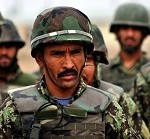The recent terrorist attack near the Indian Consulate General in Jalalabad, Nangarhar province, Afghanistan — alongside reports of the intercepted intelligence cables referring to the ISI paying half a million rupees to attack the Indian Ambassador in Kabul — is a sample of what India can expect after the NATO pullout of 2014. The Taliban’s denial of involvement must be taken with a pinch of salt, even though it is a possibility that the attack was the handiwork of either the Pakistan-based Haqqani Network — blamed for the attacks on the Indian Embassy in Kabul in 2008 —or the Lashkar-e-Taiba, whose leader Hafiz Saeed was responsible for the 2008 attacks in Mumbai.
The coming months will be crucial, and India must tread carefully. Islamabad is expected to mobilise all its resources to harass India in an effort to discourage New Delhi from playing an active role in the future of Afghanistan and reduce its presence in the country. By doing so, India will be playing directly into Pakistan’s hands. Instead, what India should do is to step up its engagement and seek to create a powerful counter balance to the Taliban by talking to non-Taliban elements. A power vacuum in Kabul is what New Delhi should be actively looking to prevent.
In the event Saudi petrodollars to Pakistan dry up, the country will still be able to rely on funding from the U.S. and a reduction of inflow of money is not on the cards, at least in the near future. Blowback aimed at Pakistan from former Taliban elements is unlikely to deter Islamabad’s designs and so, India will have to take charge of its own destiny. Battening down the hatches and staying put in Afghanistan, while bracing for Pakistan-led insurgency is the way forward for New Delhi.
Compiled by: Rajeshwari Krishnamurthy
This blog was exclusively written for Gateway House: Indian Council on Global Relations. You can read more exclusive content here.
For interview requests with the author, or for permission to republish, please contact outreach@gatewayhouse.in.
© Copyright 2013 Gateway House: Indian Council on Global Relations. All rights reserved. Any unauthorized copying or reproduction is strictly prohibited


